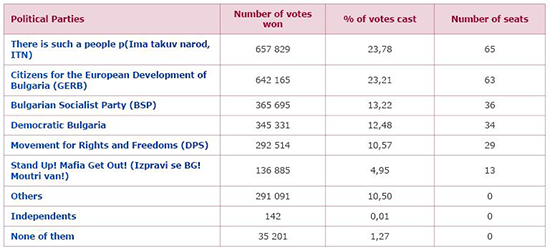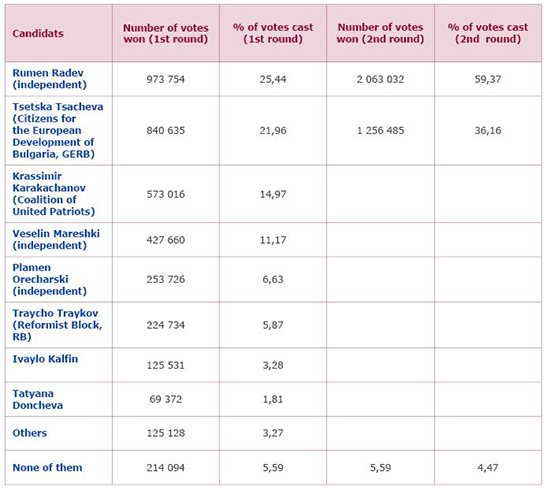Analysis
Elections in Europe
Corinne Deloy
-

Available versions :
EN

Corinne Deloy
6,708,189 Bulgarians are set to vote on 14 and 21 November to elect their President of the Republic and 240 members of the National Assembly (Narodno sabranie), the only chamber of Parliament.
21 political parties and 7 coalitions are in the running for the legislative elections, the third organised this year.
Indeed, at the end of the elections on 4 April, the President of the Republic Rumen Radev had given a mandate to each of the three personalities from the three leading parties - outgoing Prime Minister Boyko Borissov (Citizens for the European Development of Bulgaria, GERB), Slavi Trifonov (There is such a people, Ima takuv narod, ITN), and Kornelia Ninova (Socialist Party, BSP) - to form a government. But to no avail. None of them managed to gather a majority on their names or to find an agreement to set up a government of experts.
On 11 July, new parliamentary elections were held. These three parties again took the lead, with ITN ahead of GERB by a few points (23.78% of the vote) and the BSP in third place (13.22%). The leaders of these three parties were again asked by the Head of State to form a government. Once again, they all failed to gather a majority.
According to the Bulgarian Constitution, after the failure to form a government, new parliamentary elections have to be organised at the latest two months after the dissolution of the Assembly. This took place on 16 September. The mandate of the current President of the Republic, Rumen Radev, expires on 21 January 2022, and he announced on 11 September that the two elections, presidential and legislative, would be held on the same day, 14 November. A second round will be organised, if necessary, on 21 November, for the presidential election.
This double vote is a first in Bulgaria. It could contribute to increasing turnout for the parliamentary elections while one might imagine a certain lassitude among Bulgarians with this 3rd legislative election in 7 months. The simultaneous elections are also a source of savings.
The legislative elections
According to the latest opinion poll conducted by the Sova Harris Institute, GERB is expected to come out on top in the 14 November parliamentary elections with 24.2% of the vote but it will remain isolated. The BSP is forecast to take second place with 19.1% of the vote, followed by Let's Pursue Change, a coalition formed by the movement of the same name founded by Kiril Petkov and Asen Vassilev, Volt, a social-liberal party led by Nastimir Ananyev, and Georgi Manev's European Middle Class (SEC), which is forecast to obtain 14.6% of the vote, and ITN, which is forecast to obtain 14.4%. Democratic Bulgaria, a liberal coalition that brings together Yes Bulgaria, the Democrats for a Strong Bulgaria and the Greens, led by Hristo Ivanov, is expected to win 9% of the vote. Finally, the Movement for Rights and Freedoms (DPS), a party representing the country's Turkish-speaking minority, led by Mustafa Karadayi, is due to win 8.7% of the vote.
The new element in the third parliamentary election is the emergence of a new movement, Let's Pursue Change, created by Kiril Petkov, Minister of Economy, and Asen Vassilev, Minister of Finance of the expert government led by outgoing Prime Minister Yanev Stefan. Appointed on 12 May, this caretaker government holds the record for the longest tenure of such a government in Bulgaria to date. On 16 September, Kiril Petkov and Asen Vassilev left their respective posts to enter the electoral race at the head of their movement. "You know us. We want to continue in the next four years what we have achieved in the last four months," said Kiril Petkov.
Several conditions are required to join this new movement: never to have been a member of a party, to have a career outside politics and to sign a contract ensuring personal integrity. Many of the members of the movement are relatively young and have been trained abroad.
The Pursue Change coalition has set several priorities: ending corruption and theft, removing Attorney General Ivan Guechev from office, not raising taxes, improving the health and education sectors, attracting foreign investment in advanced technologies, encouraging export-oriented businesses, giving more freedom to small and medium-sized enterprises (SMEs), and distributing prosperity fairly.
"The most important thing is that the next parliament gathers a majority that can govern. This is the most difficult task. From an economic point of view, what I have seen in the last 4 months is that Bulgaria is not a poor country, it is a plundered country", said AsenVassiliev.
Kiril Petkov, who positions himself in the centre of the political spectrum, said that the movement would not collaborate with GERB or DPS. However, he said he was ready to sign a deal with Democratic Bulgaria.
The election campaign started on 15 October.
Reminder of the results of the 11 July 2021 parliamentary elections in Bulgaria
Turnout: 40.39%

Source : https://results.cik.bg/pi2021_07/rezultati/index.html
The presidential election
The President of the Bulgarian Republic (and his Vice-President with whom he forms a ticket) is elected for a 5-year term, renewable once. Candidates for the highest office can be submitted by political parties, electoral alliances or committees of voters. The presidential office is mainly honorary in Bulgaria, but the head of state has the power of veto to send a bill back to the National Assembly, which obliges the deputies to open a new debate.
The President of the Republic is the head of the army, concludes international treaties and represents his country abroad.
The Constitution prohibits the Head of State from belonging to a political party. Moreover, the President and Vice-President cannot be from the same party.
The candidates for the presidential elections of 14 and 21 November are the following:
- Rumen Radev, incumbent president, and Iliana Iotova, supported by the BSP, Let's continue the change, ITN and Stand Up! Mafia Get Out!
- Anastas Gerdzhikov, rector of Sofia University, St. Clement of Ohrid, and Nevyana Miteva, supported by GERB and the Union of Democratic Forces (ODS);
- Lozan Panov, President of the Supreme Court of Cassation, and Maria Kassimova, supported by Democratic Bulgaria;
- Mustafa Karadayi, (Movement for Rights and Freedoms) and Iskra Mihaylova. It should be noted that this is the first time that the party representing the Turkish-speaking minority in Bulgaria has presented a candidate for the presidential election;
- Milen Mihov, vice-president of the National Movement (IMRO) and Mariya Tsvetkova ;
- Goran Blagoev, journalist, and Ivelina Georgieva;
- Aleksander Tomov (Social Democratic Party) and Lachezar Avramov;
- Kostadin Kostadinov (Renaissance) and Elena Guncheva;
- Valeri Simeonov (National Front for the Salvation of Bulgaria, NFSB) and Tsvetan Manchev;
- Veselin Mareshki (Volya) and Polina Tsankova;
- Svetoslav Vitkov (People's Voice) and Veselin Belokonski;
- Volen Siderov (Ataka, A) and Magdalena Tasheva;
- Boyan Rasate (Bulgarian National Union-New Democracy) and Elena Vatashka;
- Nikolay Malinov (Russophiles for the Rebirth of the Fatherland) and Svetlana Koseva;
- Tsveta Kirilova, journalist and TV presenter, and Georgi Tatunov;
- Luna Yordanova, singer, and Iglena Ilieva;
- Yolo Denev, writer, and Mario Filev;
- Rosen Milenov, former national security officer, and Ivan Ivanov;
- Ventsislav Angelov, politician, and Darina Todorova;
- Marina Malcheva and Savina Lukanova;
- Yuri Elisavetov and Ivan Yordanov.
Rumen Radev announced on 1 February his wish to run for a second term, again with his vice-president, Iliana Iotova.
The outgoing president is popular in the country, notably because of his support for the summer 2020 protests. According to the latest opinion poll by the Alpha Research institute, he is expected to win 42.6% of the votes in the first round of voting. Rumen Radev has the support of 90% of BSP supporters and 80% of those of Stand Up! Mafia Get Out! as well as two thirds of ITN supporters and those of Let's continue the change.
The rector of Sofia University, St. Clement of Ohrid, is in second place with 28.1% of the vote. He is supported by 80% of GERB supporters, but also by the most educated voters and those living in big cities. Lozan Panov is expected to win 8.2% of the vote.
Despite his popularity and his high score in opinion polls, the outgoing head of state will find it difficult to win in the first round of voting because of the large number of candidates.
Reminder of the results of the presidential elections of 6 and 13 November 2016 in Bulgaria
Turnout: 56 .28% (1st round) and 50.44% (2nd round)

Source : http://results.cik.bg/pvrnr2016/tur2/president/index.html
On the same theme
To go further
Elections in Europe
Corinne Deloy
—
4 November 2025
Elections in Europe
Corinne Deloy
—
28 October 2025
Elections in Europe
Corinne Deloy
—
14 October 2025
Elections in Europe
Corinne Deloy
—
7 October 2025

The Letter
Schuman
European news of the week
Unique in its genre, with its 200,000 subscribers and its editions in 6 languages (French, English, German, Spanish, Polish and Ukrainian), it has brought to you, for 15 years, a summary of European news, more needed now than ever
Versions :



